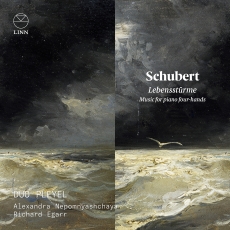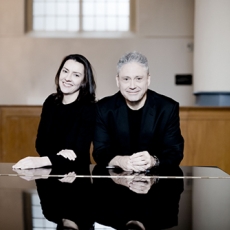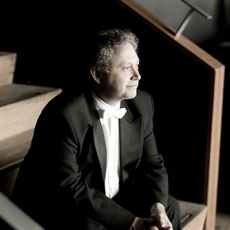Duo Pleyel - Schubert: Lebensstürme; Music for piano four-hands - Only The Music
Of all the great composers of the nineteenth century, it was Schubert who left the greatest body of work for piano four hands. Yet while it’s music of masterpiece quality, it’s also repertoire that often tends to get overlooked in today’s professional performance world, not least because it’s a rare instance that two highest-level pianists are together in the same place for long enough to establish a duo rapport and actually begin to think about a recital or a recording. However here we have a beautifully chosen snapshot of it courtesy of Duo Pleyel, i.e. not a one-off collaboration but an actual permanent duo comprised of acclaimed period keyboardists Alexandra Nepomnyashchaya and Richard Egarr, which they formed three years old with the aim of bringing the four hands repertoire to a wider public, and named after their 1848 piano by Chopin’s preferred maker, Pleyel. The first half of their programme presents two early-career works dating from 1818 when Schubert was 21: the Rondo in D major D 608 and the Sonata in B flat major D 617. We’re then zipped to the end of his painfully short life for three works penned during the year of his death, 1828 when he was still aged just 31: the Fantasie in F minor D 940, the Rondo in A major D 951 and the “Lebensstürme” (Storms of Life) Allegro in A minor D 947. Unsurprisingly, the first thing to hit the ear is the characterful sound world of the Pleyel piano itself – softly bright, highly articulated, jewel-like tones, sounding golden lower down and sharper but not acidicly so up top, and arguably more multi-coloured in its resonances than a modern concert grand. To this add joined-at-the-heart-and-hip duetting which captures with equal success the pained, sharp-edged turbulence heard in that final “Lebensstürme”, and the smiling-through-tears delicacy you get in the Sonata in B flat.



